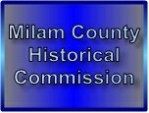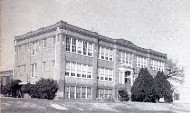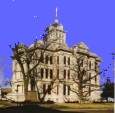Milam County Historical Commission
Milam County, Texas
Milam County, Texas






What�s in a name?
by Jeanne Williams - Temple Daily Telegram
November 22, 2010
Texas� longest-serving state treasurer shared his moniker with the famous outlaw Jesse
James
THORNDALE � �Jesse James made the rounds of the Dallas banks Friday. A friendly smile
and a hearty handshake was extended him by Dallas bankers, for this Jesse James was the
new state treasurer,� the Dallas Morning News reported.
Such good-natured teasing was a lifelong experience for Jesse William James. The comic
uproar over an honest man bearing the handle of an outlaw escalated with his
appointment by Gov. Coke Stevenson to the post of state treasurer on Oct. 25, 1941.
Born in the Sand Grove community south of Milano and reared in Thorndale, Jesse James
came by his name honestly. Though Jesse James might have secretly wished he had been
christened Bill, or George, or anything but Jesse, he good-naturedly endured the ill
fate of being named for notorious bank and train robber Jesse James, and did not
hesitate to tell the story behind the moniker.
�My father, a railroad man in Temple, was named John James,� the state treasurer told
interviewers. �Everybody called him Jesse James, so he figured I might as well be named
that.�
The unusual signature on public documents did not go unnoticed, and Jesse W. James,
Texas state treasurer, even made a listing in Ripley�s Believe It or Not.
Curiously for a man of his political stature, popularity and tenure, Texas� longest-
serving state treasurer does not rate a listing in The Handbook of Texas, and the Texas
State Archives and Library has very little information and only one photo in its
extensive files, archive officials said.
Newspapers, however, had a field day reporting about State Treasurer Jesse James and
his name identification, even when he died in office in 1977. Texas Landmarks &
Legacies wrote �whether the name�s similarity to the notorious outlaw helped his
election and re-election or not, he was able to hold his elected post for over 35
years.�
�Political observers credited his name with much of James� success,� one obituary
stated. �Texans got pleasure out of electing a man charged with overseeing the state�s
money who shared his name with a famous outlaw.�
The state treasurer also was identified as the �most successful statewide vote-getter
since Texas became a state.�
Eighteen times after he was appointed to office in 1941 did James garner a majority of
votes in statewide elections � a record unsurpassed by any state politician.
Newspapers described James as �the gregarious country boy from Milam County,� and a
�fiscal conservative, who took his responsibility to protect the state�s tax dollars
seriously, although he has been criticized in recent years for pursuing antiquated
policies.� James political career spanned Texas� transition from a rural, agriculture-
oriented state to one of the nation�s urban industrial giants, stated newspaper
reports.
James was the first-born son of J.A. James and Delia James, who lived in the Milam
County communities of Sand Grove � where Jesse was born Oct. 10, 1904 � Big Lump
between Milano and Rockdale, and eventually Thorndale. James and his 10 siblings grew
up in Thorndale. Jesse James went into law and graduated from law school and earned a
degree in business administration.
He married Mary Zana Belle of Maysfield, who became a teacher in the Thorndale school
district and Ellison Ridge School. In 1932, James was elected to the Texas House of
Representatives, running as a Democrat for House District 65 serving Milam, Lee and
Burleson counties, stated the book �Members of the Texas Legislature 1846 to 1992.�
James was elected twice more and on Sept. 1, 1937, resigned to accept appointment as
the first assistant chief clerk to then-treasurer Charley Lockhart. Lockhart resigned
in October 1941 citing health reasons, and Stevenson appointed James to serve as
treasurer.
James did not win his first race, the five-candidate clash in the 1942 Democratic
Primary, but he triumphed in the runoff. James was not seriously challenged except in
the 1956 primary, when Warren G. Harding, Dallas County treasurer, ran for the post.
Aside from his attention-getting name, Jesse James kept a low profile in state
government. He had his fair share of critics, however, who questioned his old-fashioned
financial strategies and circulated insinuations of dishonesty, charging how a $6,000-
a-year state official could be listed in Dun & Bradstreet as having a net worth of
$200,000.
James, quick to defend his integrity, explained that he side-lined selling boats, and
had developed Lake Travis Lodges, a resort. James told interviewers he was �running all
the time� for re-election, and had no plans to retire.
He confided to friends, who told newspapers that he planned to seek another term �on
top of the 36 years already served,� a Sept. 19, 1977, news story reported.
Health problems eventually bushwhacked Jesse James� political future. While in an
Austin hospital he suffered a heart attack Sept. 29, 1977, that ended his life 12 days
before his 73rd birthday, and 27 days short of completing 36 years as the state�s
banker, newspapers reported in 1977.
A far cry from the celebrated death of his outlaw namesake, Jesse James the statesman
earned flattering eulogies, and was buried in the Texas State Cemetery on Republic
Hill.
�With James� death, a major epoch in the state�s rich political history has passed,� an
obituary stated.
�He will be remembered for his longevity in office and for his tenacious management of
the state�s money.�
jwilliams@tdtnews.com
All articles from the Temple Daily Telegram are published with the permission of the
Temple Daily Telegram.
All credit for this article goes to
Jeanne Williams and the Temple Daily Telegram
Temple Daily Telegram.
All credit for this article goes to
Jeanne Williams and the Temple Daily Telegram

Texas longest serving state treasurer Jesse James, right, was born and reared in Milam County
Courtesy of Texas State Library and Archives Commission
.
.